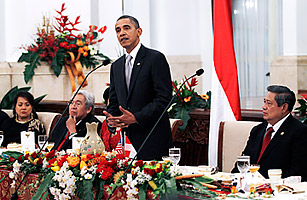
A day after President Barack Obama publicly endorsed India’s claim to a permanent seat on the U.N. Security Council, State Department spokesman P.J. Crowley poured cold water on any expectation of New Delhi’s elevation anytime soon. “It is inconceivable that you could contemplate U.N. Security Council reform without considering a country like India,” Crowley said Tuesday. “But we have to recognize … this is a process that has been going on for some time, and it is a process through which we must consult with others within the U.N. and within the Security Council.” In other words, India, don’t hold your breath.
The five permanent members, or P5, of the Security Council — the U.S., Russia, China, Britain and France — not only get to stay on when the other 10 members are rotated out every two years for replacements elected from their region, they hold the coveted veto power that allows them to nix any decisions on questions of war, peace and security that are not to their liking. That veto power has certainly helped sustain the illusion of superpower relevance for Britain and France, which have long since fallen by the wayside by measure of military strength — indeed, they had better hope nobody noticed their agreement last week to pool much of their defense capability, lest it be suggested that their two permanent Security Council seats be consolidated into one. It has also proven useful to a country like Israel, on whose behalf the U.S. has regularly intervened to block critical U.N. resolutions. Given the power that attaches to a permanent seat on the Security Council, then, it’s not hard to see why some of the incumbents are not exactly enthusiastic about sharing their status with anyone but their closest allies.